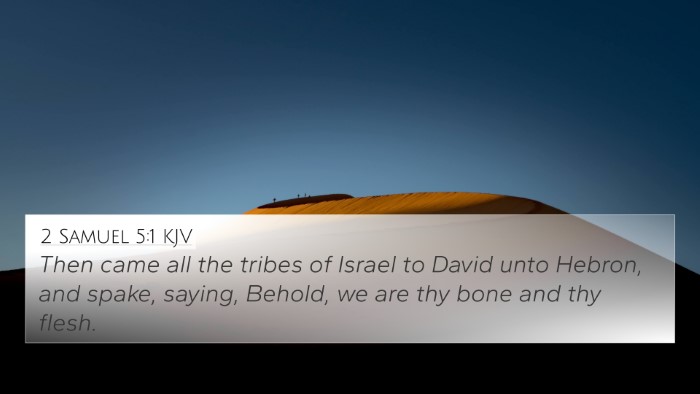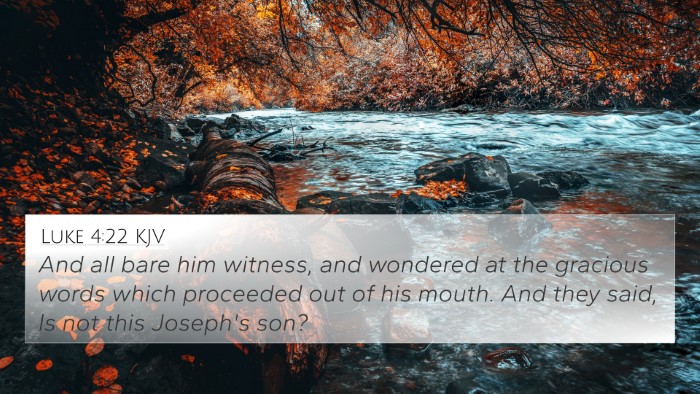Psalms 141:6 - Exegesis and Interpretations
Psalms 141:6 states: "When their judges are overthrown in stony places, they shall hear my words; for they are sweet." This verse captures a profound moment in the psalmist's plea to God regarding justice and the fate of his adversaries. Below we explore a comprehensive interpretation of this scripture drawing on insights from public domain commentaries such as those by Matthew Henry, Albert Barnes, and Adam Clarke.
Verse Meaning
This verse can be seen as an expression of the psalmist's confidence in his moral standing compared to his accusers. The "judges" represent the wicked or unjust forces that stand against the psalmist, while "stony places" symbolizes a harsh and unforgiving environment where truth is often obscured.
Matthew Henry's Commentary
Matthew Henry highlights that the "judges" represent those in power who misuse their authority. He interprets the "stony places" as the depths of despair and injustice, indicating that even in such harsh conditions, the psalmist awaits the vindication that comes from God. The sweetness of the psalmist's words reflects the divine truth that will ultimately prevail.
Albert Barnes' Commentary
Albert Barnes emphasizes that the "judges" refers to those whose actions are devoid of righteousness. He notes that the psalmist anticipates that when these judges are judged themselves, they will recognize the truth in his words. This comes as a beacon of hope for the faithful amidst adversity.
Adam Clarke's Commentary
Adam Clarke delves into the spiritual implications of the verse, suggesting that the psalmist's words carry weight due to their divine origin. According to Clarke, "sweetness" denotes the harmony that comes with divine truth. He identifies a larger theme of divine justice that is interwoven within the scripture.
Related Bible Cross References
- Psalms 37:30-31 - "The mouth of the righteous speaks wisdom, and his tongue talks of justice." This highlights the contrast between the wicked and the righteous.
- Psalms 119:103 - "How sweet are Your words to my taste, sweeter than honey to my mouth!" This resonates with the idea of God's words being sweet and comforting.
- Isaiah 54:17 - "No weapon formed against you shall prosper, and every tongue which rises against you in judgment you shall condemn." This promises protection and vindication for the faithful.
- Proverbs 25:11 - "A word fitly spoken is like apples of gold in pictures of silver." This emphasizes the value of wise speech.
- Romans 8:31 - "If God is for us, who can be against us?" This verse underlines the assurance that God's support will defeat all opposing forces.
- Revelation 21:8 - "But the cowardly, unbelieving, abominable, murderers, sexually immoral, sorcerers, idolaters, and all liars shall have their part in the lake which burns with fire and brimstone." This speaks to the ultimate judgment of the unjust.
- Micah 6:8 - "He has shown you, O man, what is good; and what does the Lord require of you but to do justly, to love mercy, and to walk humbly with your God?" This advocates for righteousness.
Thematic Connections
This verse informs several themes in the Bible surrounding justice, righteousness, and the vindication of the believers. Themes of God's justice and the ultimate fate of the wicked recur throughout scripture, linking this verse to a multitude of other biblical texts.
Inter-Biblical Dialogue
The link between Psalms and other books of the Bible provides insightful avenues for deeper understanding:
- The relational aspect of divine justice between the Old Testament and New Testament reveals how God's character remains consistent amidst historical changes.
- The acknowledgments found in the Psalms resonate with Christ's teachings of righteousness found in the Gospels, thus paving a path for thematic Bible verse connections.
Tools for Bible Cross-Referencing
For those looking to engage in cross-referencing Bible study, the following tools may enhance the experience:
- Bible concordance: Helps in identifying key words and their occurrences throughout scripture.
- Bible cross-reference guide: A resource for finding various connections between verses.
- Bible reference resources: Comprehensive materials that provide insights and biblical dialogue.
- Reference chains: Connecting scriptures for deeper thematic studies and interpretations.
How to Use Bible Cross-References
Utilizing cross-referencing, one can discover:
- Relationships between different themes found in the Bible.
- How specific verses interact and reinforce one another across scripture.
- In-depth analysis of biblical epistles and prophetic writings alongside the Psalms.
Conclusion
Psalms 141:6 stands as a significant verse within the Psalter, embodying themes of righteousness, justice, and truth. Its connections to other scriptures not only offer a window into the psalmist's heart but also illuminate the overarching narrative of God's unwavering justice throughout the entirety of the Bible. Whether through personal study or sermon preparation, understanding this verse through comparative analysis enriches one's faith and insights into scripture.














